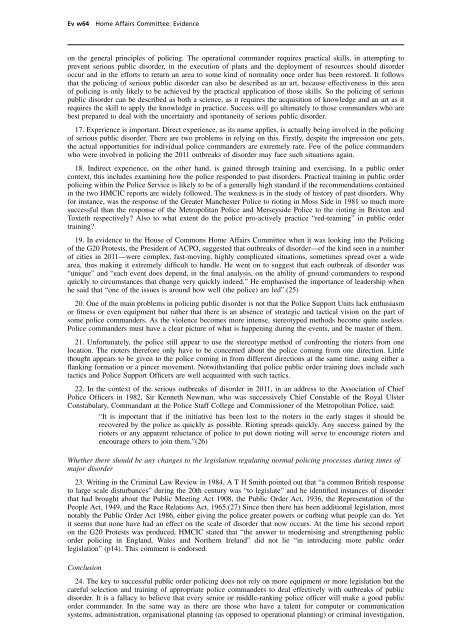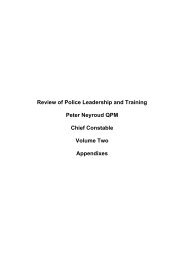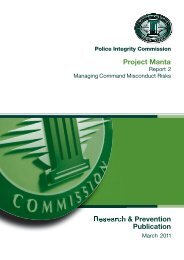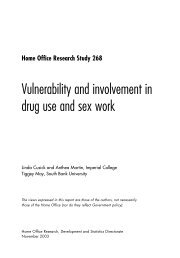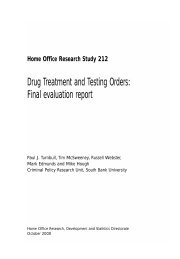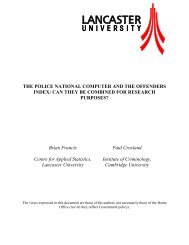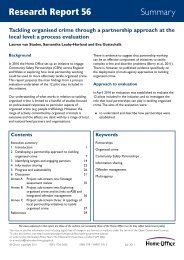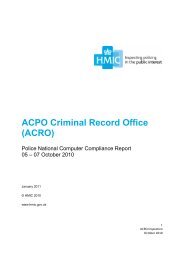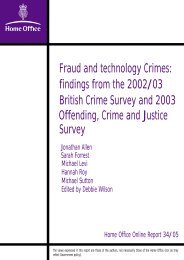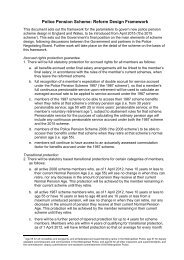Policing Large Scale Disorder: Lessons from the disturbances of ...
Policing Large Scale Disorder: Lessons from the disturbances of ...
Policing Large Scale Disorder: Lessons from the disturbances of ...
Create successful ePaper yourself
Turn your PDF publications into a flip-book with our unique Google optimized e-Paper software.
Ev w64 Home Affairs Committee: Evidence<br />
on <strong>the</strong> general principles <strong>of</strong> policing. The operational commander requires practical skills, in attempting to<br />
prevent serious public disorder, in <strong>the</strong> execution <strong>of</strong> plans and <strong>the</strong> deployment <strong>of</strong> resources should disorder<br />
occur and in <strong>the</strong> efforts to return an area to some kind <strong>of</strong> normality once order has been restored. It follows<br />
that <strong>the</strong> policing <strong>of</strong> serious public disorder can also be described as an art, because effectiveness in this area<br />
<strong>of</strong> policing is only likely to be achieved by <strong>the</strong> practical application <strong>of</strong> those skills. So <strong>the</strong> policing <strong>of</strong> serious<br />
public disorder can be described as both a science, as it requires <strong>the</strong> acquisition <strong>of</strong> knowledge and an art as it<br />
requires <strong>the</strong> skill to apply <strong>the</strong> knowledge in practice. Success will go ultimately to those commanders who are<br />
best prepared to deal with <strong>the</strong> uncertainty and spontaneity <strong>of</strong> serious public disorder.<br />
17. Experience is important. Direct experience, as its name applies, is actually being involved in <strong>the</strong> policing<br />
<strong>of</strong> serious public disorder. There are two problems in relying on this. Firstly, despite <strong>the</strong> impression one gets,<br />
<strong>the</strong> actual opportunities for individual police commanders are extremely rare. Few <strong>of</strong> <strong>the</strong> police commanders<br />
who were involved in policing <strong>the</strong> 2011 outbreaks <strong>of</strong> disorder may face such situations again.<br />
18. Indirect experience, on <strong>the</strong> o<strong>the</strong>r hand, is gained through training and exercising. In a public order<br />
context, this includes examining how <strong>the</strong> police responded to past disorders. Practical training in public order<br />
policing within <strong>the</strong> Police Service is likely to be <strong>of</strong> a generally high standard if <strong>the</strong> recommendations contained<br />
in <strong>the</strong> two HMCIC reports are widely followed. The weakness is in <strong>the</strong> study <strong>of</strong> history <strong>of</strong> past disorders. Why<br />
for instance, was <strong>the</strong> response <strong>of</strong> <strong>the</strong> Greater Manchester Police to rioting in Moss Side in 1981 so much more<br />
successful than <strong>the</strong> response <strong>of</strong> <strong>the</strong> Metropolitan Police and Merseyside Police to <strong>the</strong> rioting in Brixton and<br />
Toxteth respectively? Also to what extent do <strong>the</strong> police pro-actively practice “red-teaming” in public order<br />
training?<br />
19. In evidence to <strong>the</strong> House <strong>of</strong> Commons Home Affairs Committee when it was looking into <strong>the</strong> <strong>Policing</strong><br />
<strong>of</strong> <strong>the</strong> G20 Protests, <strong>the</strong> President <strong>of</strong> ACPO, suggested that outbreaks <strong>of</strong> disorder—<strong>of</strong> <strong>the</strong> kind seen in a number<br />
<strong>of</strong> cities in 2011—were complex, fast-moving, highly complicated situations, sometimes spread over a wide<br />
area, thus making it extremely difficult to handle. He went on to suggest that each outbreak <strong>of</strong> disorder was<br />
“unique” and “each event does depend, in <strong>the</strong> final analysis, on <strong>the</strong> ability <strong>of</strong> ground commanders to respond<br />
quickly to circumstances that change very quickly indeed.” He emphasised <strong>the</strong> importance <strong>of</strong> leadership when<br />
he said that “one <strong>of</strong> <strong>the</strong> issues is around how well (<strong>the</strong> police) are led”.(25)<br />
20. One <strong>of</strong> <strong>the</strong> main problems in policing public disorder is not that <strong>the</strong> Police Support Units lack enthusiasm<br />
or fitness or even equipment but ra<strong>the</strong>r that <strong>the</strong>re is an absence <strong>of</strong> strategic and tactical vision on <strong>the</strong> part <strong>of</strong><br />
some police commanders. As <strong>the</strong> violence becomes more intense, stereotyped methods become quite useless.<br />
Police commanders must have a clear picture <strong>of</strong> what is happening during <strong>the</strong> events, and be master <strong>of</strong> <strong>the</strong>m.<br />
21. Unfortunately, <strong>the</strong> police still appear to use <strong>the</strong> stereotype method <strong>of</strong> confronting <strong>the</strong> rioters <strong>from</strong> one<br />
location. The rioters <strong>the</strong>refore only have to be concerned about <strong>the</strong> police coming <strong>from</strong> one direction. Little<br />
thought appears to be given to <strong>the</strong> police coming in <strong>from</strong> different directions at <strong>the</strong> same time, using ei<strong>the</strong>r a<br />
flanking formation or a pincer movement. Notwithstanding that police public order training does include such<br />
tactics and Police Support Officers are well acquainted with such tactics.<br />
22. In <strong>the</strong> context <strong>of</strong> <strong>the</strong> serious outbreaks <strong>of</strong> disorder in 2011, in an address to <strong>the</strong> Association <strong>of</strong> Chief<br />
Police Officers in 1982, Sir Kenneth Newman, who was successively Chief Constable <strong>of</strong> <strong>the</strong> Royal Ulster<br />
Constabulary, Commandant at <strong>the</strong> Police Staff College and Commissioner <strong>of</strong> <strong>the</strong> Metropolitan Police, said:<br />
“It is important that if <strong>the</strong> initiative has been lost to <strong>the</strong> rioters in <strong>the</strong> early stages it should be<br />
recovered by <strong>the</strong> police as quickly as possible. Rioting spreads quickly. Any success gained by <strong>the</strong><br />
rioters or any apparent reluctance <strong>of</strong> police to put down rioting will serve to encourage rioters and<br />
encourage o<strong>the</strong>rs to join <strong>the</strong>m.”(26)<br />
Whe<strong>the</strong>r <strong>the</strong>re should be any changes to <strong>the</strong> legislation regulating normal policing processes during times <strong>of</strong><br />
major disorder<br />
23. Writing in <strong>the</strong> Criminal Law Review in 1984, A T H Smith pointed out that “a common British response<br />
to large scale <strong>disturbances</strong>” during <strong>the</strong> 20th century was “to legislate” and he identified instances <strong>of</strong> disorder<br />
that had brought about <strong>the</strong> Public Meeting Act 1908, <strong>the</strong> Public Order Act, 1936, <strong>the</strong> Representation <strong>of</strong> <strong>the</strong><br />
People Act, 1949, and <strong>the</strong> Race Relations Act, 1965.(27) Since <strong>the</strong>n <strong>the</strong>re has been additional legislation, most<br />
notably <strong>the</strong> Public Order Act 1986, ei<strong>the</strong>r giving <strong>the</strong> police greater powers or curbing what people can do. Yet<br />
it seems that none have had an effect on <strong>the</strong> scale <strong>of</strong> disorder that now occurs. At <strong>the</strong> time his second report<br />
on <strong>the</strong> G20 Protests was produced, HMCIC stated that “<strong>the</strong> answer to modernising and streng<strong>the</strong>ning public<br />
order policing in England, Wales and Nor<strong>the</strong>rn Ireland” did not lie “in introducing more public order<br />
legislation” (p14). This comment is endorsed.<br />
Conclusion<br />
24. The key to successful public order policing does not rely on more equipment or more legislation but <strong>the</strong><br />
careful selection and training <strong>of</strong> appropriate police commanders to deal effectively with outbreaks <strong>of</strong> public<br />
disorder. It is a fallacy to believe that every senior or middle-ranking police <strong>of</strong>ficer will make a good public<br />
order commander. In <strong>the</strong> same way as <strong>the</strong>re are those who have a talent for computer or communication<br />
systems, administration, organisational planning (as opposed to operational planning) or criminal investigation,


